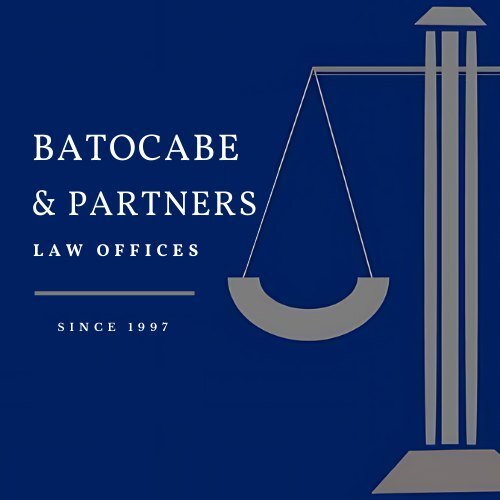Best Conveyancing Lawyers in Pasig
Share your needs with us, get contacted by law firms.
Free. Takes 2 min.
Free Guide to Hiring a Real Estate Lawyer
List of the best lawyers in Pasig, Philippines
About Conveyancing Law in Pasig, Philippines
Conveyancing refers to the legal process of transferring property ownership from one party to another. In Pasig, Philippines, as in other parts of the country, conveyancing typically involves drafting, reviewing, and executing necessary legal documents to ensure valid and lawful property transfers. The process encompasses checks for clean title, taxes, and compliance with local ordinances. Whether buying, selling, or inheriting real property, understanding the conveyancing process is vital to avoid disputes and ensure the transaction is both legal and binding.
Why You May Need a Lawyer
Hiring a lawyer for conveyancing in Pasig is not legally required for every property transaction, but it is highly recommended. Lawyers are trained to notice potential legal issues and ensure that the transfer complies with Philippine laws. Common situations where legal help is essential include:
- Complicated property history or unclear title ownership
- Multiple heirs or disputed inheritance
- Transaction values requiring careful due diligence
- Transfer involving corporate or foreign entities
- Addressing unpaid taxes, liens, or encumbrances
- Reviewing contractual terms in sale or transfer documents
- Ensuring proper registration with government agencies
A lawyer can safeguard your interests, reduce risks, and resolve problems that may arise during the conveyancing process.
Local Laws Overview
Conveyancing in Pasig, Philippines, is governed by a mix of national laws and local ordinances:
- Property Registration Decree (Presidential Decree No. 1529) - Governs the system for registration of titles and deeds, providing security of land tenure.
- Civil Code of the Philippines - Contains key rules on property, sales, donations, and succession which impact conveyancing.
- Transfer Taxes and Fees - Local government units, including the Pasig City government, impose taxes such as the Transfer Tax, Documentary Stamp Tax, and Registration Fees.
- Real Property Tax Code - Mandates payment and clearance of real property taxes before transfer or registration.
- Barangay Clearance and Local Requirements - Some property transfers may require additional clearances from the barangay or local City Hall offices.
Compliance with both national and local rules is crucial for valid conveyancing transactions in Pasig.
Frequently Asked Questions
What is the role of a lawyer in conveyancing?
A lawyer helps by reviewing documents, ensuring title authenticity, advising on applicable laws, preparing contracts, and guiding you through legal requirements for a smooth property transfer.
Is hiring a lawyer required for property transfers?
Although not always legally required, hiring a lawyer is highly recommended to avoid costly errors or disputes, especially in complex transactions.
How long does the conveyancing process take in Pasig?
The process can range from a few weeks to several months, depending on issues like document completeness, tax compliance, and registration timelines.
What taxes and fees must be paid when transferring property?
Typical expenses include Documentary Stamp Tax, Transfer Tax, Capital Gains Tax, Real Property Tax arrears (if any), and Registration Fees paid to the Registry of Deeds.
Can foreigners buy property in Pasig?
Foreigners are generally not allowed to own land in the Philippines, though they may own condominium units subject to foreign ownership limits. Consult a lawyer for specific cases.
What documents are needed for conveyancing?
Essential documents include the original Certificate of Title, Deed of Absolute Sale, valid IDs, BIR tax clearance, Real Property Tax clearance, and community tax certificates.
What is the significance of the Title in a property transfer?
The Title is the legal proof of ownership that must be transferred from seller to buyer at the Registry of Deeds to formalize the new ownership.
What steps are involved in registering the property transfer?
After settling taxes and fees, the parties submit documents to the Registry of Deeds, which reviews and records the new owner. A new title is then issued in the buyer's name.
What happens if there are legal issues with the property title?
Issues such as title disputes, liens, or encumbrances must be resolved before transfer. A lawyer can advise on solutions or mediation if problems arise.
Do both parties need to be present for conveyancing procedures?
Typically, both parties or their authorized representatives must sign documents, but arrangements can be made via Special Power of Attorney for those unable to attend.
Additional Resources
For further information and guidance, consider the following resources and offices in Pasig:
- Registry of Deeds - Handles registration and transfer of titles
- Bureau of Internal Revenue (BIR) - Processes tax clearance and Documentary Stamp Tax
- Pasig City Hall - Issues transfer tax assessment and local clearances
- Integrated Bar of the Philippines (IBP) - Provides lists of accredited local lawyers
- Legal Aid Centers - Offer free or low-cost consultations for eligible individuals
Next Steps
If you require legal assistance for conveyancing in Pasig, here are suggested next steps:
- Gather all documents related to the property, including titles, tax declarations, and previous transfer records.
- Consult with a licensed lawyer who specializes in real estate or property law in the Philippines.
- Discuss the specific details of your case to identify potential legal obstacles or special requirements.
- Follow your lawyer's guidance on document preparation, tax payments, and interaction with government offices.
- Attend scheduled appointments at government offices as needed for verifications and signing of documents.
- Keep records and copies of all completed documents and receipts.
Navigating the conveyancing process in Pasig can feel complex, but with proper planning and expert legal guidance, you can ensure a smooth and legally sound property transaction.
Lawzana helps you find the best lawyers and law firms in Pasig through a curated and pre-screened list of qualified legal professionals. Our platform offers rankings and detailed profiles of attorneys and law firms, allowing you to compare based on practice areas, including Conveyancing, experience, and client feedback.
Each profile includes a description of the firm's areas of practice, client reviews, team members and partners, year of establishment, spoken languages, office locations, contact information, social media presence, and any published articles or resources. Most firms on our platform speak English and are experienced in both local and international legal matters.
Get a quote from top-rated law firms in Pasig, Philippines — quickly, securely, and without unnecessary hassle.
Disclaimer:
The information provided on this page is for general informational purposes only and does not constitute legal advice. While we strive to ensure the accuracy and relevance of the content, legal information may change over time, and interpretations of the law can vary. You should always consult with a qualified legal professional for advice specific to your situation.
We disclaim all liability for actions taken or not taken based on the content of this page. If you believe any information is incorrect or outdated, please contact us, and we will review and update it where appropriate.











